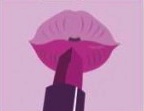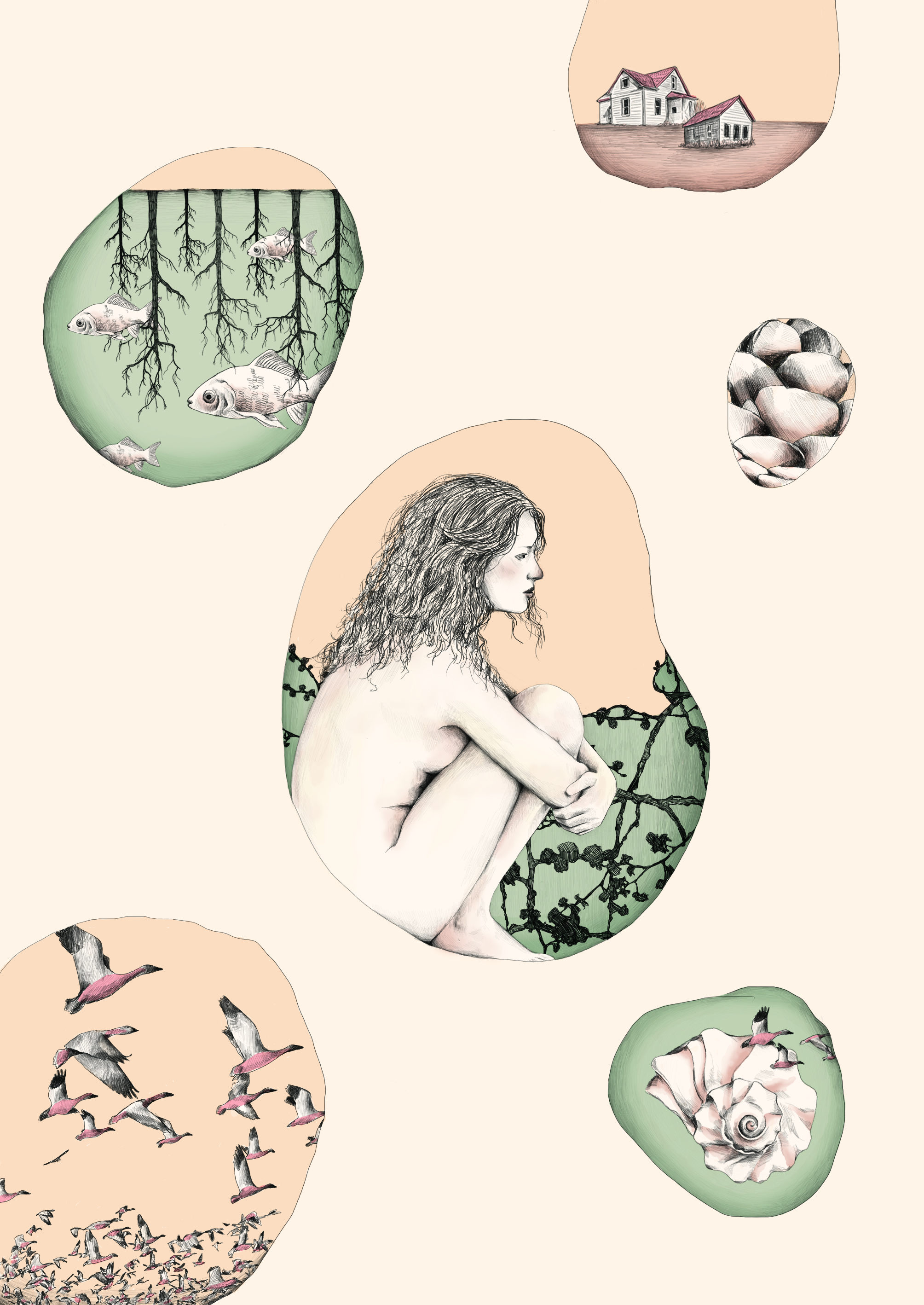by Sarah Seltzer
Ironing
2013 Fiction Prize Winner
“Esther,” she squeaked out.
“Okay cutie,” he said. “Bring your racket.”
She nodded and watched him glide away, “cutie” reverberating in the air. A window had opened with that word; a real one, not imaginary. She might puke with excitement. She had to see this mission through.
She walked towards Condado. Her thighs rubbed together and her shorts rode up inside them, about a centimeter. Her aunt said she wasn’t growing taller. True, a small puddle of belly now spilled out over her bikini shorts. She should do sit-ups. Yes: she had to iron herself out from top to bottom. Sweat gathered behind her neck and beneath her breasts.
She stopped halfway across the causeway for a breath. The tide flowed beneath her feet from the wild Atlantic into the lagoon. Her hotel looked like a dollhouse. She felt dizzy but kept on down an avenue lined with shops whose windows held the little frogs, dolls and seashells that her family called tchotchkes, always in a singsong voice—chach-kees!
She passed two homeless men asleep on the sidewalk, one cop with a machine gun, dozens of tourists and six elderly people awaiting the bus. Where did the bus take them, and wouldn’t it be nice to just sit on it until the end of the line? Esther imagined the ride, the bumpy road, the sea views, the small houses growing smaller and smaller as they left San Juan’s center behind. Perhaps there was a perfect pink house for her and Tennis Boy, with laundry in the yard and some chickens.
Next to the bus stop she saw a group of teenagers, American boys. They reminded her of her cousins, but older. Like Tennis Boy, too. Their laughter was harsh; they barely saw her pass.
Esther hurried towards Walgreen’s and shoved the door open, standing still in an oasis of air conditioning and discount beauty products.
“You get them!” “No, you do!” a pair of teenagers giggled in the condom aisle.
Esther hid her face, sidestepped them on the way to the hair section. She had enough cash to buy the iron and for added kicks the cheapest eyeshadow, mascara and lipstick she could find.
At the register the woman gave her everything in a plastic bag.
“Gracias,” Esther blurted out.
“That iron works good on curls,” the cashier said in approval—or was it disapproval?
Tremors traveled through Esther’s limbs: what if her mom woke up and missed her? But she was bursting with the need of it, to use her new purchases, to rip open the plastic and erase her face, tame her tangles. She slipped into the lobby of the Condado Plaza hotel and followed the signs to the ladies lounge.
Once there, she savagely attacked the box with the iron in it, unsheathed it and plugged it in. While it began to heat up, she fell upon the makeup, hurling the pieces of packaging in the trash. She stood at the mirror: shadow, stroke, fill. She didn’t know what she was doing but she was doing something: dab, line, stroke. Her eyes became encircled by big dark patches.
The iron radiated heat. Esther inhaled, then ran it down each curl, pressing it against the strands, stopping when she felt the singe, the crackle on the ends of her hair.
Oh, the sick smell of it. She had a friend who cut herself. Another friend who had stopped eating anything but balled up pieces of white bread. Esther kept going: lock by lock, kink by kink, she conquered the flyaways until a woman who reminded her of her mother barged in.
“Ugh! It smells like burning! Why are you doing this down here, honey?”
“My mom’s sleeping.” No lie. Still, she ought to return. Tonight they were going to Old San Juan for dinner.
“Giving yourself a makeover?” the lady asked
“Sort of.”
“You’re gorgeous. Don’t change—you’re too young.” The woman went into a stall.
Shut up old woman, Esther wanted to say. Usually, she never even thought things like that. The woman began to pee. Esther looked at herself in the mirror and she couldn’t help it; she grinned. She had done it; she was beautiful.
Esther held her head up high on the way home and let her hips sway, slightly, like Lin’s did. She smiled to herself. She had done it. She noticed the American boys in college sweatshirts and backwards caps on the sidewalk, milling, and stared at them: frank, natural, bold.
This time they noticed her too.
“Yo. What’re you looking at?” one asked. She froze.
They swarmed, like the bench spilling over after a school basketball game. They were fourteen or older; it couldn’t be her they were lurching towards. She instinctively crossed her arms across her chest, looked down, walked on.
“Why is she not answering?” she heard. “Raccoon eyes.”
“You were checking us OUT, girl. J, she likes you.”
“Her tits are big!”
“Where’s she going? So rude!”
“Hey chica!” They were tourists like her. Maybe they even went to her school, and she’d have to see them in January. Esther walked faster, engulfed by blasts of hot shame. Why had she looked their way? Why had she been excited when they looked back? Her face perspired; her eye makeup was running down the sides of her nose.
“Why won’t you talk to us?”
“Ugh, fuck her!”
“Would you, though?”
“I’d hit it.”
She lost them on the causeway, hearing over the din her raggedy breath. “Leave me alone!” she told the air.
Evening was arriving on the lagoon; she watched the white scrim of the waves hit the breakers. Salt settled on her tongue; air moved across her damp neck.
Esther lifted up her hand, weakly, and spent her last five dollars on a cab that took her 800 feet.
She looked at her selves, all eight of them, in the mirrors of her hotel lobby. Gone was the frizzy hair, yes, but she saw now that the effect looked off, as if her head were straining against a leash. The tendrils near her face remained fuzzy: sweat.
Yes, her eyes looked like a raccoon’s, her lips lurid, a cheap imitation of Lin or the girls at school. A tchotchke.
Tennis Boy, dressed in black shiny fabric, blocked her way to the elevator.
“I kicked your cousin’s ass in tennis,” he said cheerfully. “Your mascara’s running,” he added, as if it were obvious that she would wear mascara. She put a hand to her face. “Well see ya, Chia! Hey, that rhymes,” he said, finding her mute.
Esther slid down the side of the elevator and sat on the floor as it climbed. She was
Chia Pet, yes, but he wasn’t Tennis Boy. He was Andrew, Josh, Evan or Jake. Of course he had a girlfriend; boys like that just did. She saw Tennis Boy raising his racket and sending an ace over the net, leaving her relatives speechless.
Her mother paced the hallway, growing frantic. She pulled Esther by her arm and then wrapped her in a smothering hug—an act which led Esther to spill the details of her subterfuge and a few more tears.
In the taxi to dinner Esther learned there would be consequences for her actions. She heard the words “chores” and “grounded.” But her mom wished it were easier, she did. She believed she had raised Esther to be herself, not underhanded. Esther, wretched, wished her mom would hug her again or go back to sleep.
The trees in the old city’s plazas were festooned with lights that slid up and down like drops of illuminated water. Kids set off firecrackers and pigeons swooped, then hobbled around eating the clusters of crumbs.
“Whoa, you look different,” said Esther’s brother. “I miss your Jewfro.”
“She looks good,” said the older cousin.
“I see you’re putting more into your appearance,” her aunt whispered. “It’s about time. Easier on the eye makeup, easier on the dessert.”
“Your aunt has a problem,” said her mother. “Don’t listen, Estie.”
Tunes engulfed the plaza, but Esther heard only the replay of the day: the rough talk of the boys, laughter from her would-be lover, her aunt’s fretting.
Esther sought refuge in her mind, but imagined only the high balcony of her room and herself climbing the railing. She felt herself overtaken by a wave. She dodged a car swerving towards her on the causeway.
She sensed in a thousand ways her visibility, her invisibility. Maybe she even sensed a future of being overlooked, leered at, always wanting: objects packaged as salvation that never were, promised approval that never came.
The trees rained light. Somewhere close by, waves swept in against the rocks, the soft sand. Her cousins tossed a tennis ball in a circle. The moist breeze with its fingers began lifting each tendril of her hair and lacing it in a spiral, undoing her work.
Her journey to Walgreen’s felt filthy: a betrayal, a waste. But she felt she’d have to make it again, to flatten and press things down until they burned at the edges. How endless, how exhausting this would be, like the tide coming in each morning for years, wearing down the sandcastles the children built.
Esther squeezed her eyelids shut, then opened them. But wait—what if there was still a chance? She craned her neck, strained to get a glimpse of Tennis Boy walking the street towards her, hoping still for a rescuer, for a story that wasn’t hers.
Sarah Marian Seltzer is a journalist, essayist and fiction writer. Her work has appeared in Ms., the Washington Post, the Hairpin and the Forward. Tweeting as @sarahmseltzer.
www.sarahmseltzer.com
2013 Fiction Prize Winners
The articles in this special section:

On discovering a man I was secretly in love with wrote a poem portraying me in an unflattering light
by Stephanie King
2013 Fiction Prize Winner

 Please wait...
Please wait...